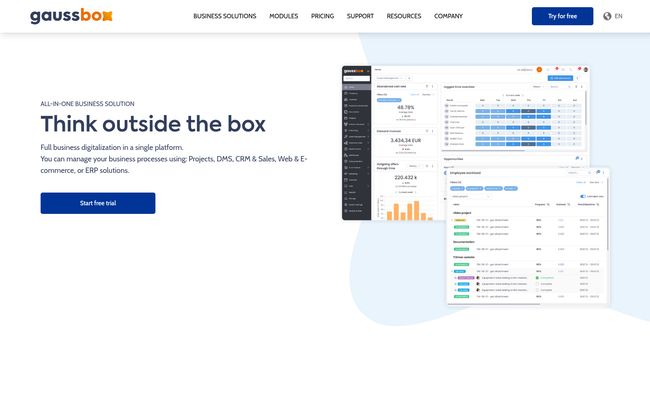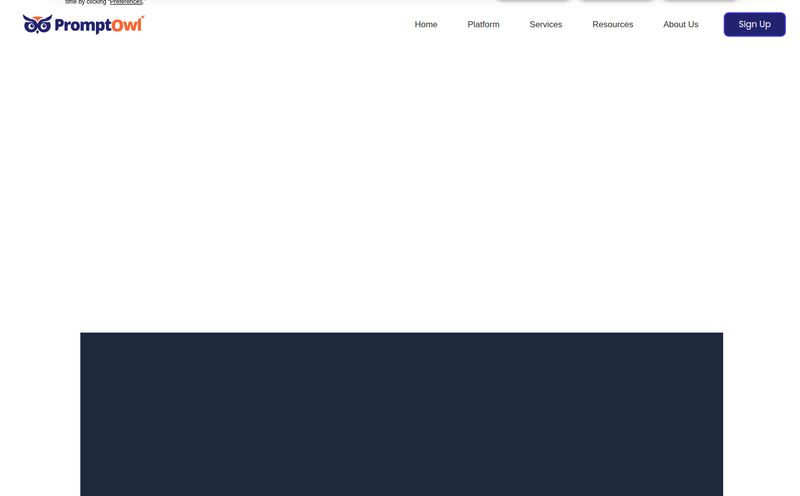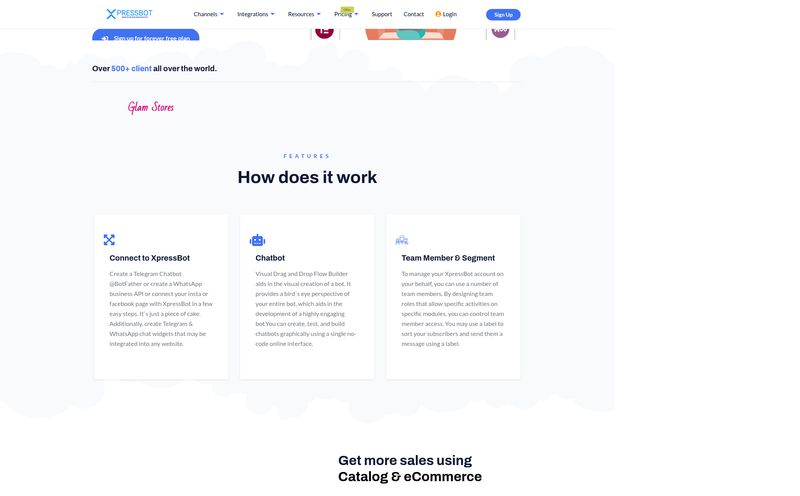How many browser tabs do you have open right now? And how many of those are for different software-as-a-service (SaaS) tools you need just to get through the day? One for your CRM, another for project management, one for your email marketing, another for billing, and… oh wait, you forgot the password for the CMS again.
It’s a digital circus. A chaotic mess of subscriptions, logins, and data that never quite syncs up. I’ve been in the SEO and digital marketing trenches for years, and I’ve seen this exact scenario cripple the productivity of countless businesses. We spend more time trying to get our tools to talk to each other than we do actually doing the work. It’s like trying to build a car with parts from a dozen different manufacturers. Sure, you might get it to roll, but it’s gonna be a bumpy, inefficient ride.
Every now and then, a platform comes along that promises to be the holy grail: the one tool to rule them all. Today, we’re looking at one of those contenders: Gauss Box. It claims to be an all-in-one, AI-powered solution. Big words. But can it really declutter our digital lives? Let's take a look.
So, What Exactly is Gauss Box?
At its core, Gauss Box is a cloud platform designed to bring all your business processes under one digital roof. Think of it as the central nervous system for your company. Instead of having separate systems for sales, marketing, projects, and web management, Gauss Box integrates them into a single, cohesive environment.
What caught my eye is its origin. It’s touted as the first Croatian ALL-IN-ONE Business Solution. I have a soft spot for innovators coming from different corners of the tech world, not just Silicon Valley. It often means they're building something to solve very real, practical problems they've faced themselves.
The platform is built on two main pillars: digitalization and optimization. It helps you move your operations online (if you haven't already) and then uses AI to make those operations smarter and more efficient. We're talking about things like intelligent workflows and deep analytics to see what’s actually working and what's just wasting time.

Visit Gauss Box
Ditching the App Graveyard: What Can Gauss Box Replace?
This is the part that probably matters most to your wallet and your sanity. The big promise of an all-in-one platform is consolidation. Based on what Gauss Box puts forward, it’s aiming to replace a significant chunk of a typical company’s software stack.
Imagine unsubscribing from all of these:
- Communication Apps: Think Slack or Microsoft Teams.
- Email Services: Your external email marketing platform like Mailchimp.
- Billing Applications: Tools like FreshBooks or QuickBooks for invoicing.
- CMS Platforms: Your WordPress or similar website backend.
- Project Management Tools: The Asanas, Trello's, and Jiras of the world.
- CRM Software: Your HubSpot or Salesforce instance.
The idea of having all that data—customer interactions, project progress, sales pipelines, website performance—in one place is incredibly appealing. No more exporting CSVs from one platform to import them into another. No more “digital duct tape” trying to connect systems that were never meant to speak the same language. It's a single source of truth, and in business, that's priceless.
A Look Inside the Toolbox: The Integrated Modules
Gauss Box isn't just one monolithic program; it's a collection of interconnected modules you can likely tailor to your needs. This modular approach is smart, as not every business needs a full-blown ERP system right out of the gate. Let’s break down what's inside.
Managing Your Business Core
This is the bread and butter of any serious business platform. Gauss Box offers a CRM & Sales module to manage your customer relationships and sales funnel. This is coupled with a Projects module for task and team management. For larger operations, they even offer full ERP (Enterprise Resource Planning) solutions, which can handle everything from inventory to human resources. It seems they're trying to cater to both growing businesses and established enterprises.
Your Digital Storefront and Marketing Machine
This is my territory. The platform includes modules for Web & E-commerce, allowing you to build and manage your online presence directly within the system. This is a huge advantage for SEO and analytics because your website data isn't siloed. It lives right next to your sales and customer data. There are also dedicated modules for Lead Management and Marketing, which I assume handle everything from campaigns and automation to performance tracking.
The Nitty-Gritty: Operations and Data
Then you have the foundational stuff. A DMS (Document Management System) and Storage to keep your files organized and secure. Modules for Contacts, Company info, and even a Calendar. They've also included some interesting ones like E-learning, which could be fantastic for internal training, and a module for managing company Cars. Talk about comprehensive.
Let's Talk Money: The Gauss Box Pricing Conundrum
Okay, let's address the elephant in the room. You go to their pricing page, and you see… well, not much. There are toggles for Monthly and Annually (with a nice carrot of getting 2 months free on an annual plan), but no concrete pricing tiers are listed. Instead, you're prompted to "Create your Gauss Box," which likely leads to a questionnaire or a sales call.
Honestly, this is a pet peeve of mine. I’m a huge advocate for transparent pricing. However, in the world of highly customizable, modular platforms, it's not entirely uncommon. It suggests they're not selling a one-size-fits-all product. The price is probably heavily dependent on which modules you need, the number of users, and the scale of your operation. It’s a bespoke suit, not an off-the-rack one.
What they do list are their add-on services: Business and Marketing consulting at €50 per hour. This is a reasonable rate and shows they’re ready to offer hands-on help, which is a good sign.
My advice? Don’t let the lack of a price tag scare you off immediately, but do go in with a clear budget and a list of your absolute must-have features before you engage with their team.
The Good, The Bad, and My Honest Take
No tool is perfect, so let’s get down to it. What I love is the sheer ambition. The goal of replacing a dozen other tools is a noble one, and if they pull it off, it’s a massive win for business owners. Having all your data in one secure, accessible cloud platform is the dream. The level of customization also seems to be a huge plus, allowing the system to grow with you.
On the flip side, that same strength can be a weakness. A platform this extensive can be overwhelming at first. The learning curve might be steep, and without proper onboarding (which, to be fair, their consulting services might provide), users could feel lost in a sea of features. And as mentioned, the opaque pricing model requires you to commit to a conversation before you even know if it’s in your ballpark, which can be a hurdle for smaller, fast-moving teams.
Who Is This Really For?
So, who should be ringing up Gauss Box?
I don't think this is for the solo freelancer who is perfectly happy with their simple stack of free tools. This platform seems best suited for small to medium-sized businesses (SMBs) and enterprises that are feeling the growing pains of a disjointed tech stack. If you're a manager constantly complaining that the sales team's data doesn't match the marketing team's reports, you are their target audience.
Industries that juggle complex projects, large customer databases, and multi-channel sales—like manufacturing, consulting, or even larger agencies—could see immense benefits. It's for the business that's ready to stop patching holes and build a proper foundation for growth.
Frequently Asked Questions About Gauss Box
- 1. What is Gauss Box in simple terms?
- Think of it as a central command center for your business. It's a single cloud-based platform that combines tools for sales (CRM), marketing, project management, e-commerce, and internal operations, all powered by AI to make things run smoother.
- 2. Is Gauss Box fully customizable?
- Yes, that seems to be one of its main selling points. It's a modular system, so you can choose the components you need and tailor the platform to fit your specific business processes, rather than changing your processes to fit the software.
- 3. How do I find out the pricing for Gauss Box?
- You won't find a standard price list on their website. Pricing is customized based on your specific needs. You'll need to contact their team through the "Create your Gauss Box" process to get a personalized quote.
- 4. What kind of tools can Gauss Box replace?
- It aims to replace a wide array of separate software, including your CRM (like Salesforce), project management tools (like Asana), email marketing platforms, billing software, and even your website's content management system (CMS).
- 5. Is Gauss Box suitable for a very small business or startup?
- It could be, especially for a startup that wants to build on a scalable foundation from day one. However, the custom pricing model and the sheer breadth of features might be more than a very small business needs. It's likely most effective for businesses that are already managing a team and multiple complex processes.
- 6. What does "AI-Powered Optimization" actually mean?
- While they dont spell it out in extreme detail, it typically means the system uses artificial intelligence to analyze your data and processes. This could manifest as intelligent workflow suggestions, predictive sales analytics, customer behavior insights, or automated reporting that helps you make better decisions.
Is It Time to Think Inside the Gauss Box?
Look, the quest for the “perfect” all-in-one tool is a long one, and there are many contenders. Gauss Box presents a very compelling case, especially for businesses drowning in complexity. The idea of unifying everything from your first marketing touchpoint to your final invoice in one system is, frankly, beautiful.
It's not a simple, plug-and-play solution you can buy with a credit card in five minutes. It’s a strategic investment in your company’s operational infrastructure. If you’re at a point where the friction between your current tools is costing you more in time and lost opportunities than a new system might cost in dollars, then exploring something like Gauss Box isn't just a good idea—it's a necessary next step.
It might just be the thing that lets you finally close all those extra tabs.



